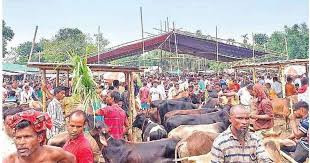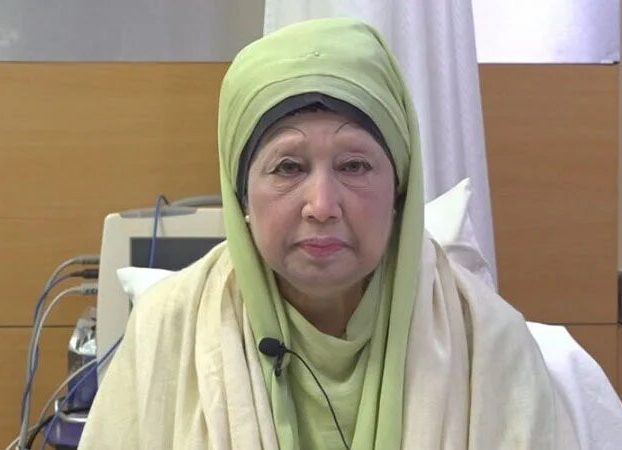
Even though the holy Eid-ul-Azha is approaching, the sale of sacrificial animals in Rangpur has not gathered. Cows and goats are selling less. This time the price is not available. However, the leaseholders, farm owners and animal sellers of Hatbazar are expecting that the sale of cattle will increase a few days before Eid.
Sekander Ali, a farmer of Menanagar village in Taraganj, said, “There are fewer buyers in the market this time.” I don’t understand anything. There is no more time for Eid to come. A lot of cows were bought and sold during this time.
Abdur Rauf, a farmer of Syarbakshipara village, said that four months ago he bought 10 cows to sell at Qorbani market. The price of each cow (weighing approximately 120 kg) was 85-90 thousand taka. In four months, about 36 thousand rupees were spent on feeding each cow, including food. It has cost 1 lakh 21 thousand to 1 lakh 26 thousand rupees till now, including the purchase of each cow.
Last Monday, he sold four cows (weighing approximately 188 kg each) at Qurbani market in Taraganj for Tk 1 lakh 36 thousand to 1 lakh 38 thousand. It can be seen that he earned 10-11 thousand taka per cow in four months.
Taraganj Hat is the biggest animal market in Taraganj. Sahidar Rahman, the lessee of this market, said that two thousand cows were sacrificed at Taraganj market last Monday, but only 419 were sold. On average, 350 are sold in this market during normal times. Last time, more than eight hundred cows were sold at this time. This year, the price of cattle in Qorbani Market is almost the same as last year. Although the supply of cows in the market is sufficient, buyers are few so far. Farmer Haider Ali of Shahapur village of Badarganj upazila said that there are 15 cows in his farm. But he said that he will sell the cows after Eid as the price is lower compared to the cost.
Another farmer of that village, Sadekul Islam, said, “Last Monday, I sold two 20-month-old cows weighing 5-6 maunds from home for 2 lakh 78 thousand taka. 2 cows were from the house. In 20 months, the expenditure including food was about 1 lakh 20 thousand taka. This time, according to the cost, the cow market in Qorbani is less. There are less buyers in the market.
Mokarram Hossain of Badarganj municipality’s Hospitalpara village said, “The weight of the cow bought for the purpose of sacrifice cannot be seen. However, I bought a sacrificial cow weighing approximately 90 kg for 66 thousand taka. The price seems lower this time.
Gangachara Upazila Livestock Officer Sakhawat Hossain said with that information, the supply of sacrificial animals is sufficient in the upazila this time.
Gangachara upazila farmer Sujan Ahmed said, he has prepared seven cows for sacrifice. About 70 thousand rupees have been spent on each cow so far. But because the price is low, he has not taken the cows to the market yet.
Milan Mia, another farmer of Gangachara, said that he has already sold three of the seven cows suitable for sacrifice. Excluding expenses, he got 35 thousand taka in those three cows.
Farmer Saiful Islam of Kaikuri Chaluniya village of Pirgacha upazila of Rangpur said that there are 30 indigenous cows suitable for sacrifice in his farm. Out of this, he has already sold 10 cows and got Tk 11 lakh. He said, “I haven’t calculated the amount of profit yet. However, as the price of food is high, the amount of profit will be very less. He also said that last year, he made a profit of at least 8 lakh by selling 30 cows in Qorbani.
Assistant Livestock Officer (Animal Health) of Badarganj Livestock Office. Abdul Quader said, many people do not want to take the trouble of buying sacrificial animals in advance. If you buy again, the cost of feeding increases. Because of this, many people buy sacrificial animals at the last stage. Rangpur district livestock office sources said that the number of farmers in the district is 25 thousand. This year 3 lakh 59 thousand animals are ready for sacrifice. The demand in the district is 2 lakh 20 thousand. There is a surplus of 1 lakh 40 thousand animals.
District Livestock Officer Enamul Haque said that 140,000 surplus slaughterable animals will be sold elsewhere in the country after meeting the demand of the district.
It has been found that the farmers are busy with harvesting and threshing Boro paddy in the current season. Many people are repaying the loan by selling paddy. Aman spends his days thinking in advance to meet the expenses of the season ahead. Farmers and common people are struggling to manage their families due to rising commodity prices. Because of this, many have left the thought of sacrifice out of their heads
Khabir Uddin, a farmer from Dangapara village in Taraganj, said, “Every year I offer a kari garut bhaag (sacrifice).” I can’t do it now. Selling paddy in (debt) paying off. Re-planting will take place. Now it is difficult to run the family.

 Reporter Name
Reporter Name 


















